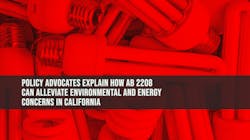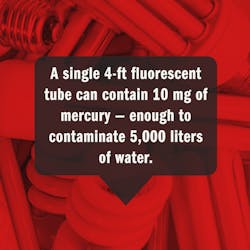Across the United States, fluorescent phaseouts are gaining momentum. In September 2022, California’s Governor Gavin Newsom signed AB 2208 into law. Authored by Ash Kalra and Senator Josh Becker, AB 2208 will prohibit sales of mercury-containing compact fluorescent light bulbs in 2024 and prohibit linear fluorescent and pin-based compact fluorescent lamp sales in 2025.
By banning the sale of fluorescent lamps, California extends existing legislation to protect consumers from toxic mercury while at the same time accelerating its transition to LEDs. California will reap significant financial benefits from this decision — because LEDs use half as much electricity as fluorescents, retrofitting a small office would save $6,000 over a typical LED lamp’s lifetime, while a school could save as much as $24,000. LEDs also reduce replacement costs and waste because they last 2–3 times longer than fluorescents, and there is no need to pay for costly hazardous waste disposal.
Furthermore, a recent market study found that by 2030, AB 2208 will have helped California save more than $1 billion annually on electricity bills, achieve annual electricity savings of about 5,600 GWh, and avoid the release of 950,000 metric tons of CO2 per year. This move will also benefit the local LED industry; the state imports 100% of its fluorescent light bulbs, yet there are more than 50 LED lighting companies based in California, employing local people to design and produce cleaner, more efficient lighting.
And since LEDs use half the power of fluorescent, the law’s passage will also free up electricity on the grid, coming at a time when California is facing energy shortages and the threat of rolling blackouts.
Moving forward to mitigate toxins
All fluorescent lamps contain mercury, a hazardous neurotoxin classified as one of the top ten chemicals of public health concern by the World Health Organization. When a fluorescent bulb breaks, it releases its mercury into the environment, creating an exposure risk to anyone in the area, especially pregnant women, nursing mothers, and young children. The amount of mercury per bulb may sound small — a single 4-ft fluorescent tube can contain 10 mg of mercury — but that’s enough to contaminate 5,000 liters of water.
John Bouchard, Principal Officer of Teamsters Local 350, expressed the organization’s support for AB 2208: “Our members manage waste and recycling materials every day, potentially exposing them to numerous risks. Mercury exposure from broken fluorescent lamps is an invisible and yet very dangerous risk to their health.”
Fluorescent light bulbs are classified as hazardous waste and it is illegal in California to dispose of them in the trash. California has a Household Hazardous Waste collection infrastructure, but lack of convenience and awareness results in most bulbs being improperly thrown in the trash or recycling streams. Unfortunately, the fragile lamps easily break in the process and contaminate municipal waste streams, polluting our soil and water. Chuck Helget of Republic Services, a waste management firm, noted, “We support the removal of mercury from our homes and waste streams. AB 2208 will protect Californians, including our own employees that currently deal with these hazardous products on a daily basis.”
AB 2208 represents a triple win for California. It is highly cost-effective, reduces CO2 emissions, and eliminates a key source of toxic mercury from the waste stream. Other states can achieve the same benefits by adopting similar legislation to remove toxic fluorescent lamps from their markets. By making AB 2208 law, California leads the nation in bidding farewell to fluorescents. We invite other states to contact the National Stewardship Action Council or Clean Lighting Coalition (CLiC) if they would like insights and assistance in achieving the same results.
More on lamps regulation and policy
Signify addresses Minamata Convention position on moving to mercury-free lighting
Revised EU regulations light the way to more stringent requirements for light sources
Get to know our experts
HEIDI SANBORN and JORDAN WELLS represent the National Stewardship Action Council, a 501(c)(4) nonprofit organization that advocates for a circular and equitable economy across the U.S.
Sanborn is the founding director of the National Stewardship Action Council. With more than 30 years’ experience as a leader in the solid waste industry, she is an expert on Extended Producer Responsibility and product stewardship. Sanborn also represents Ward 7 on the Sacramento Municipal Utility District Board. She holds a Master of Public Administration in nonprofit and government management from University of Southern California and a bachelor’s degree in political science from University of California, Davis.
As special projects manager at NSAC, Wells assists the executive director with communications, managing, and growing the organization. She also participates in coalitions like the American Sustainable Business Council’s Sustainable Packaging Working Group. Wells received a bachelor’s degree in sustainability from San Diego State University and studied abroad at the University of Oxford, and she was awarded the Outstanding Graduate Award by the Sustainability Department at SDSU based on her GPA and extracurricular activities.
MICHAEL SCHOLAND, LC is the evidence base and E.U. lead at the Clean Lighting Coalition, a global partnership launched to capture the health and environmental benefits of eliminating mercury-based lighting. He is also senior advisor at CLASP, an NGO that develops programs and supports policy to mitigate climate change and expand access to efficient appliances and equipment.
Scholand is Lighting Certified with the NCQLP and has more than 20 years’ experience in energy efficiency initiatives. He holds a double-major bachelor’s degree in mechanical engineering and environmental studies as well as a master’s degree in civil and environmental engineering, both from Tufts University.
For up-to-the-minute LED and SSL updates, follow us on Twitter. You’ll find curated content and commentary, as well as information on industry events, webcasts, and surveys on our LinkedIn page and our Facebook page.
Michael Scholand | Clean Lighting Coalition
MICHAEL SCHOLAND, LC is the evidence base and E.U. lead at the Clean Lighting Coalition, a global partnership launched to capture the health and environmental benefits of eliminating mercury-based lighting. He is also senior advisor at CLASP, an NGO that develops programs and supports policy to mitigate climate change and expand access to efficient appliances and equipment.






